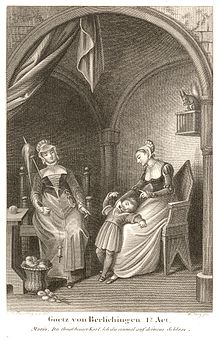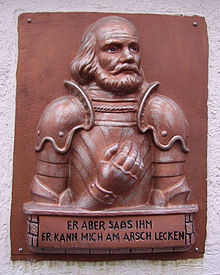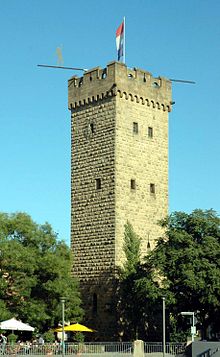Götz von Berlichingen (Goethe)
| Data | |
|---|---|
| Title: | Götz von Berlichingen with the iron hand |
| Original language: | German |
| Author: | Johann Wolfgang von Goethe |
| Publishing year: | 1773 |
| Premiere: | April 12, 1774 |
| Place of premiere: | Berliner Comödienhaus under the direction of Heinrich Gottfried Koch |
| Place and time of the action: | Franconia , Bavaria , Württemberg , early 16th century |
| people | |
|
|
Götz von Berlichingen with the Iron Hand is a play in five acts by Johann Wolfgang von Goethe, premiered in 1774 . The Franconian - Swabian Imperial Knight Gottfried " Götz " von Berlichingen zu Hornberg (called "with the Iron Hand ") was the model for the main character .
The piece is considered a major work by Sturm und Drang . Similar to his Götz, Goethe wanted to tear down boundaries with this piece. He opposed the previous theater conventions. The units of place, time and action are canceled: There are a total of more than fifty locations, and the time shown is not limited to one day, but rather extended by several parallel actions (trial before the court, the peasant war , several feuds and raids) .
Götz comes from the medieval world of the law of fists and feuds, but also acts across all classes by z. B. helps the farmers. With his figure, free knighthood, based on natural law and loyalty, encounters the world of the scheming nobility, which is committed to abstract Roman law. Goethe's Götz proves a character that overcomes historical conventions, but his utopia of an ideal monarchy, based on individual independence on the one hand and personal loyalty on the other, brings him into conflict with the emerging bourgeois society. So Götz is fighting a losing battle from the start. Ultimately, with resignation, he has to state: Freedom only exists in the hereafter, but the world is a prison.
Goethe's Götz was u. a. an important stimulus for Friedrich Schiller's drama Die Räuber .
action

First elevator
Götz von Berlichingen is in a feud with the Bishop of Bamberg because he is holding one of his servants prisoner and torturing him. He succeeds in capturing Adelbert von Weislingen, a childhood friend in the service of the bishop, and taking him to his castle in Jagsthausen , where he influences him to switch sides. To seal the newly concluded loyalty alliance, Weislingen becomes engaged to Berlichingen's sister Maria.
second elevator
Bamberg's reaction was not long in coming. Liebetraut, a courtier, persuades Weislingen to go back to Bamberg. He lures him with "favor of women, princes and flattery". Weislingen becomes unsure and wants to venture a short visit to Bamberg.
In the bishop's residence, Weislingen falls in love with the seductive Adelheid von Walldorf and is persuaded by her to resume his service with the bishop.
third elevator

Berlichingen connects his sister with Franz von Sickingen, assaults rich merchants in revenge for the capture of one of his rider boys and is then banned from the Empire by the Kaiser, who was influenced by Weislingen, and persecuted with a specially recruited execution army. The hunted holed up in his castle, at whose siege the famous Götz quote (“ Swabian greeting ”) utters: “Surrender to me! On mercy and disgrace! Who are you talking to! Am I a robber! Tell your captain: As always, I have due respect for your Imperial Majesty. But he, tell him, he can lick my ass! ”When he finally had to give in to the attackers, he negotiated a free withdrawal, but was arrested anyway.
Fourth elevator
Berlichingen is brought to justice in Heilbronn town hall, where he protests his innocence. Sickingen freed him by force by advancing with 200 men in front of the city and threatening to set it on fire. Berlichingen retreats again to its castle.
Fifth elevator
Insurgent farmers want to make Berlichingen their captain on their murder and robbery expedition. After initial resistance, he can be persuaded to take over the task for a short time on the condition that the farmers refrain from further acts of violence. But the farmers break the promise and Berlichingen has to experience that shortly afterwards Miltenberg is attacked and burned down. Berlichingen, who found shelter in a gypsy camp, is captured by Weislingen's horsemen.
Adelheid has grown tired of Weislingen and strives for the favor of the new emperor. Weislingen's squire Franz, Adelheid's lover, is so influenced by her that he lets himself be persuaded to poison Weislingen. The desperation over his act, however, makes him commit suicide afterwards. Adelheid is sentenced to death by a vein court for adultery and murder.
Berlichingen, imprisoned in the Heilbronn tower, dies in the presence of his wife and sister with the words: “Heavenly air - freedom! Freedom! "Elisabeth's answer:" Only above, above with you. The world is a prison. "
History of origin
Goethe developed the concept of the piece in Strasbourg , but no more evidence is known of this. In 1771 he put down a first manuscript in Frankfurt am Main (the so-called “Urgötz”), which was published after his death in 1832 and which is based on the autobiography of the title hero. There is also a second version from 1773, which is smoother and more concentrated than the first. This was premiered on April 12, 1774 at the Berlin Comödienhaus in the production of the theater director Heinrich Gottfried Koch in historical costumes (unusual at the time) with great success. The next production of the play followed in Hamburg in October of this year under the direction of Friedrich Ludwig Schröder , in which historical backdrops were used in addition to historical costumes.
There is also a third version from 1804, intended for the Weimar Theater , the performance of which lasted five hours at the time. The differences in content between the three versions primarily concern the role of Adelheid von Walldorf.
reception
The immediate effect of the drama was sensational; it made the young author famous in one fell swoop. Since the success of the play was based not least on the reversal of traditional notions of rank and reputation , members of other noble families asked the author, who had suddenly become popular, whether he would also like to immortalize their gender in literary terms.
Today, the play is performed annually at the Jagsthausen Castle Festival in Burg Jagsthausen , Götz von Berlichingen's literary home . To this end, important actors such as Benno Sterzenbach , Max Reimann and Hermann Schomberg are hired for the main role, including Alexander Golling , one of the most prominent Götz actors of the post-war period. In 2014, the role of Götz was taken on by the well-known film actor Götz Otto, directed by Michael Bogdanov .
In Heilbronn , where the historical Götz was trapped in the bulwark tower for one night , another tower in the city was named "Götzenturm" in memory of Goethe's Götz .
The drama was filmed in 1978 under the title Götz von Berlichingen with the Iron Hand , directed by Wolfgang Liebeneiner, with Raimund Harmstorf in the title role.
Expenses (selection)
- 1st version: Goethe's works. Weimar Edition, Vol. 39.Weimar 1897.
- 2nd version: Goethe's works. Weimar Edition, Vol. 8. Weimar 1889.
- 3rd version: Goethe's works. Weimar Edition, Vol. 13.1 and 13.2. Weimar 1894 and 1901.
- Reading edition: Götz von Berlichingen with an iron hand. A play. With comments by Volker Neuhaus. Stuttgart: Reclam , 2002 ( Reclam's Universal Library No. 71). ISBN 3-15-000071-8 .
- Radio play: Götz von Berlichingen with the iron hand. Bayerischer Rundfunk , 1958. Arrangement: Leopold Ahlsen , Heinz von Cramer . Music: Bernd Scholz . Director: Heinz-Günter Stamm .
Literature (selection)
- Ilse Appelbaum-Graham: From Urgötz to Götz. In: Yearbook of the German Schiller Society 6, 1965, pp. 245–282.
- Rüdiger Bernhardt : Johann Wolfgang von Goethe: Götz von Berlichingen. King's Explanations and Materials (Vol. 8). C. Bange Verlag , Hollfeld 2002, ISBN 978-3-8044-1696-3 .
- Kathleen Ellenrieder: Reading key to Johann Wolfgang Goethe: Götz von Berlichingen. Reclam ( Reclams Universal-Bibliothek 15331), Stuttgart 2003, ISBN 978-3-15-015331-4 .
- Walter Hinderer (ed.): Goethe's dramas. Interpretations. Reclam (Reclams Universal Library No. 8417), Stuttgart 1993, ISBN 3-15-008417-2 .
- Ekkehart Mittelberg (Ed.): Johann Wolfgang Goethe: Götz von Berlichingen. Text and materials, edited by Heinz Joachim Schüßler. "Classical School Reading" series. Cornelsen , Berlin 1997, ISBN 3-464-12132-1 .
- Ekkehart Mittelberg: Johann Wolfgang Goethe: Götz von Berlichingen with the iron hand. Teacher's booklet. Series of classic school reading. Cornelsen, Berlin 1999, ISBN 3-464-12133-X .
- Volker Neuhaus : Johann Wolfgang Goethe, Götz von Berlichingen. Explanations and documents. Extended and bibliographically supplemented edition. Reclam (Reclams Universal Library No. 8122), Stuttgart 2003, ISBN 3-15-008122-X .
- Gero von Wilpert : Goethe-Lexikon (= Kröner's pocket edition . Volume 407). Kröner, Stuttgart 1998, ISBN 3-520-40701-9 , p. 5 (last entry: Adelheid von Walldorf ).
Web links
- Götz von Berlichingen with the iron hand at Zeno.org .
- Götz von Berlichingen with the iron hand in the Gutenberg-DE project
- Götz von Berlichingen as an audio book at LibriVox
- Christine Kunzmann, Andreas Theel: The historical "Götz" and its epoch. , Lecture on the history of literature, Ludwig-Erhard Schule, Pforzheim, January 8, 2001 ( PDF file ; 502 kB)
- Drawings for Goethe's "Götz von Berlichingen" by Franz Pforr
- Goethe's "Götz von Berlichingen" in illustrations by Johann Heinrich Ramberg
- Götz von Berlichingen: A play. With woodcuts based on drawings by Eugen Neureuther. - Stuttgart (among others): Cotta, 1846. Digitized edition of the University and State Library Düsseldorf
- Otto Brahm : The stage adaptation of Götz von Berlichingen . Goethe-Jahrbuch , Volume 2 (1881), pp. 190–216: Digitized
Remarks
- ^ Richard Maria Werner : The first performance of Götz von Berlichingen . Goethe-Jahrbuch , Volume 2 (1881), pp. 87-100: Digitized
- ↑ Alternative spelling: Hanns von Selbitz ( Götz von Berlichingen with the iron hand at Wikisource )
- ↑ While Goethe let his Götz live in Jagsthausen (alternative spelling: Jaxthausen ) and die at a young age, the historical Götz was over 80 years old and spent most of his life at his Hornberg Castle.
- ↑ Alternative spelling: Jaxthausen ( Götz von Berlichingen with the iron hand at Wikisource )
-
↑ In some editions the passage (conclusion of the 17th scene) is given in a defused version:
[...] But he, tell him, he can ... drive to the devil (editions of German classics, 14th volume, Goethes Götz von Berlichingen , Verlag Ferdinand Schöningh , Paderborn 1922, p. 117) or
[...] But he, tell him, he can me ... ( Götz von Berlichingen with the iron hand at Wikisource ) - ↑ Historically things looked different: the farmers burned down the castles Wildenberg and Limbach, but the citizens of Miltenberg sympathized with the farmers.
- ↑ Kindler's New Literature Lexicon , Volume 6, p. 472.
- ↑ Because Goethe was not prepared to do so, a Baron von Riedesel offered a price of 20 ducats for a play “which should make his family as famous as the Berlichingen. The prize was to be awarded at the Leipzig Fair in 1777, and the baron was bold enough to ask for Lessing to be the judge. But there was no one who took care of the Riedesels. Rüdiger Safranski, Goethe and Schiller. Story of a friendship. Munich 2009, p. 21.


